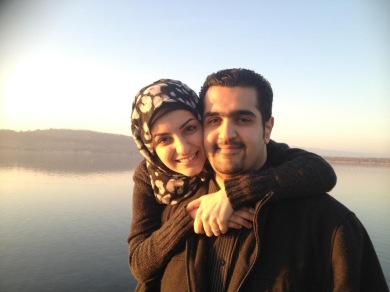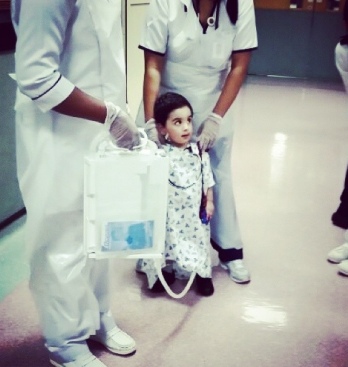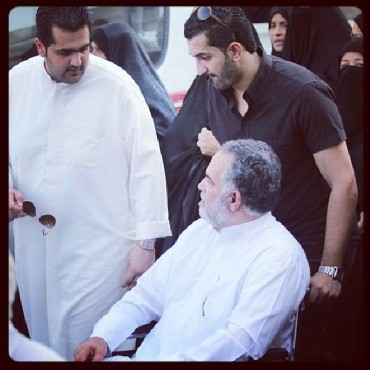After five days of terror and hopeless waiting, Hussain Jawad, chairman of European-Bahraini Organisation for Human Rights (EBOHR) is still detained despite the order for his release. He was arrested from his home in Sitra on Monday, February 17th at 1:20 am. His wife Asma Darwish witnessed the incident, and was left with nothing but a typical short phone call a little over ten hours after his arrest, that left her heart pounding even more than it was before the call.
Darwish, who is also an active member of EBOHR said she had never heard his voice this weak before. She had the gut feeling that this time it won’t be alright. He told her he was okay, but when she asked him if they harmed him, he said yes and ended the phone call. Despite her great concert and worry, Darwish’s determination to speak up and voice her husband’s case is anything but weak:
Right around the fourth anniversary of the Bahraini uprising, it is unfortunate to see things haven’t really changed for the better. Jawad has been arrested for the second time since the uprising, and taken to the Criminal Investigation Directorate (CID), leaving behind his wife with their two-year-old son Parweez who has just started to recognize his father again after a history of detention and exile.
He was with his wife, son, and mother, when masked civilian men and riot police stormed in and searched the house and the bedroom. An entourage of police cars, armored vehicles, a civilian car, and a mini bus came to arrest him. His phone and passport were confiscated, and he was not allowed to change his clothes before they took him.
Little Parweez stood in silence watching the theatrical operation of his father’s arrest, and didn’t say a word. He was nine months old when his father was arrested the first time. As young as he is, like his father, he has a calm sharp sense to him with a deeper understanding beyond his age. His mother carried him outside where Jawad was taken to the minibus, and asked him “where is baba going?” Little Parweez said “ to prison”. He had visited his grandfather in prison before; it’s not new to him. Darwish says, despite Parweez saying that his dad is going to prison, he still doesn’t understand whether his dad is traveling, or coming back soon, and when she asks him about his dad, he sometimes says he went to the gym.
Although it’s the second time her husband has been arrested, she says this time was different. His arrest came as a surprise to his family, and they are clueless as to what the new charges could be. She explained they usually send him a summon letter, and he always shows up at the police station.
“This time, the way they stormed in, searched the place, all within ten minutes and didn’t even give him a chance to change or hug his son to say goodbye. It hurt me to see them holding his head down between his knees, not allowing him to look up.”
Today, Jawad still faces trial for previous charges related to insulting the king and inciting hatred against the regime.
Since his brief phone call, Darwish says she has seen him online on the social network application “Whatsapp” several times.
“It is very frustrating to see him online every now and then, knowing that they have his phone and are reading through his private conversations with me and other people,” she said.
<script async src=”//platform.twitter.com/widgets.js” charset=”utf-8″></script>
She claims she tried to call him at least four times, but the phone call gets disconnected immediately after the first ring. During a recent family visit to Jawad’s father in prison, the prominent figure said he too tried calling his son from Jaw prison and got the same result.
Jawad is not a stranger to the human rights field in Bahrain. His father Parweez Mohammed, sentenced to fifteen years in prison, is one of the 13 prominent political figures locked up for taking part in the uprising in 2011. Following his father’s lead, Jawad spent his youth learning from his dad and other human rights defenders like Abdulhadi Alkhawaja. He always spoke about the great teachers he learned from as he embedded himself in the human rights field.
The idea of starting EBOHR came to Jawad while he was in Switzerland in 2012. With the help of Darwish, they brought the idea to life at a time when Bahrain lacked human rights NGOs, especially a European one. Slowly the organization attracted more Bahraini activists in Bahrain and outside.
His active role as a human rights defender has previously subjected him to harassment by the Bahraini authorities. The latest was his arrest in November 2013, when he went to file a complaint against the government claiming they were defaming him in a local newspaper. He was arrested on spot at the Central Province Police station and taken to the dry dock prison where he spent 47 days. His arrest came following a speech he delivered calling for peaceful struggle and democracy. During his imprisonment he managed to monitor and document many cases and violations against detainees, which he revealed following his release in January 2014 on bail pending trial.
Looking for a better future, Jawad decided that it was best to leave Bahrain and seek refuge in the United Kingdom, where he could practice his job safely. Little did he know that the next eight months would be nothing but a drag that led to a dead end in his asylum case. He was greeted by UK Border Agency officials at Heathrow airport, and taken to a medium security prison for illegal immigrants. His case was placed in a special program called DFT (Detained Fast Track), designed for uncomplicated cases that would eventually be returned to their home countries, despite his strong case for asylum.
Jawad spent his time in London at a youth center operated by a Bahraini community, quickly integrating and earning his peers’ respect. As the light at the end of the tunnel kept getting dimmer regarding his asylum case, Jawad started to feel homesick. Being away from his family was his weakest point. Behind that strong, calm, and fierce look, is a sensitive and family-oriented man. He often spoke about his wife and son and how much he missed them. He was in deep pain that he was away while his son grew up away from his father. He felt helpless when his son had to undergo an open-heart surgery and he couldn’t be there to support him and his wife. However his personal struggles and challenges did not keep him from focusing on the cause he believed in. Jawad is known for his positive optimistic attitude at all times. His work didn’t stop, he kept monitoring the situation in Bahrain, and speaking up against violations at events and meeting.
Eventually, Jawad decided to return to Bahrain and continue his fight for human rights on the ground. Darwish said he told her that international human rights organizations valued the testimonies of activists on the ground more than those abroad.
“He told me he feels his presence in Bahrain was better for the cause even if it was risky, he can do more from inside especially that many were in jail at the time, or in exile.”
She recalls the memory of his return and how happy he felt to be back. After his detention and exile abroad, he finally had the chance to spend time with his son who was a little over one year old at the time.
“He spent a great time with family, especially my family, which made them love him and respect him even more.”
Darwish says he spent every night working until 2:00 or 3:00 in the morning. When she told him to come to bed and get some rest, he answered her “how can I go to sleep when people are still in prison, depending on us to fight for their cause?”
He puts himself in other people’s shoes, says Darwish. When he stops everything and take a phone call from a victim’s mother, he tells his wife: “how would you feel if I got detained and you tried to reach out to an activist and they turned you down?”
His genuine care for the people and their needs defines him as a person and earned him admiration amongst not only family, but also strangers. That was evident during the first arrest. Darwish says the visits Jawad paid to the families of victims and prisoners, and the effort he put into working on their cases, showed in the amount of genuine messages she got from strangers, telling her how much they appreciate her husband’s effort.
As a wife, Darwish values the fact that her husband is a principled man, who does the right thing for the right reasons. She says his biggest role model in life is his father.
“I am very proud to be married to someone who is so attached to his dad as much as Hussain is. He is ready to do anything for him. He has been carrying his father’s case for four years, and that needs a lot of patience and effort.”
His legacy affected his ability to find a job, because employers fear the consequences of hiring him. Jawad thought it may be for the best, so he can give his undivided attention to his true passion, human rights. Darwish says he told her he wants to be a human rights defender on an international level, and eventually work for the United Nations. His aspirations travel beyond prison bars, and beyond Bahrain.
* Original article on EBOHR’s website


